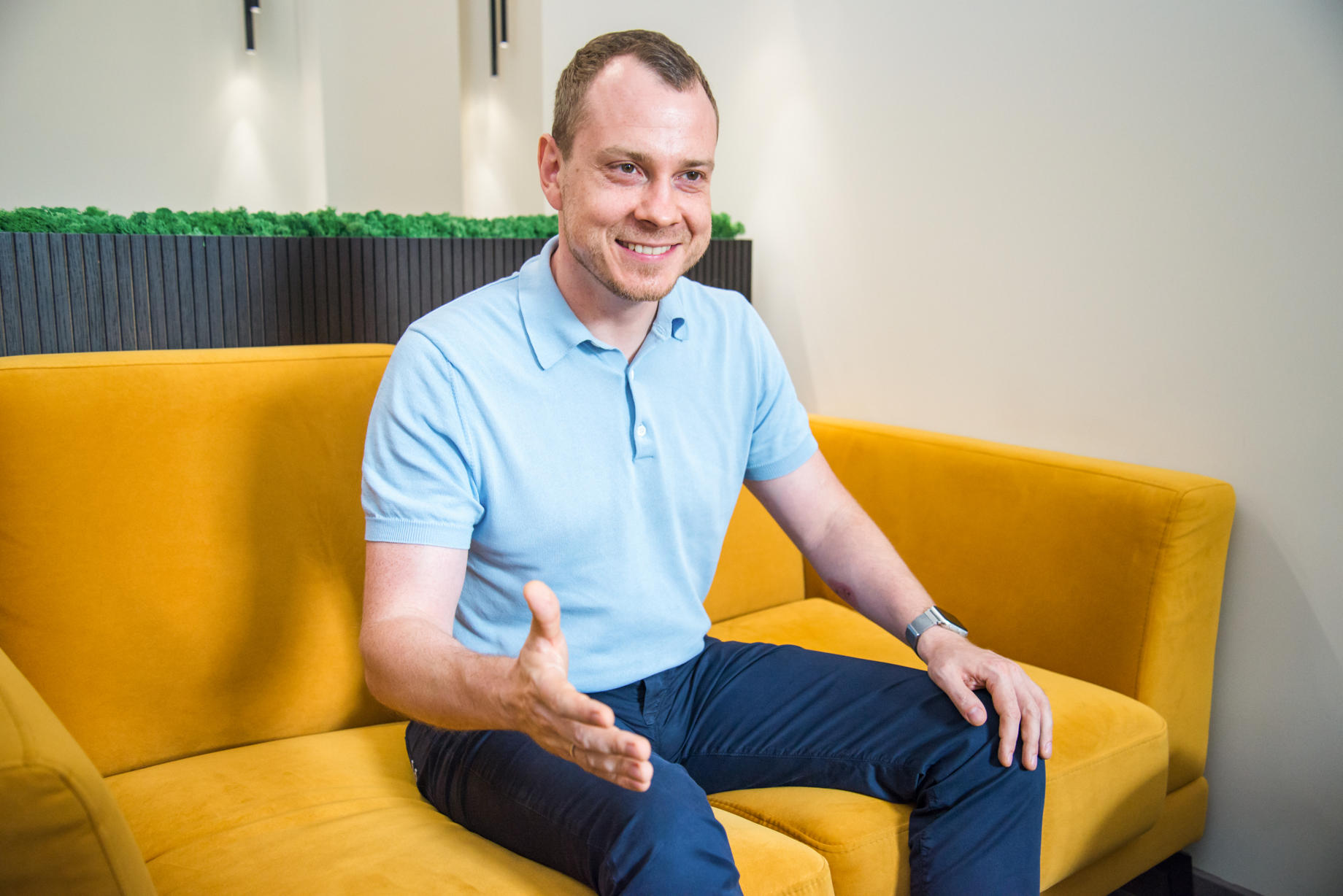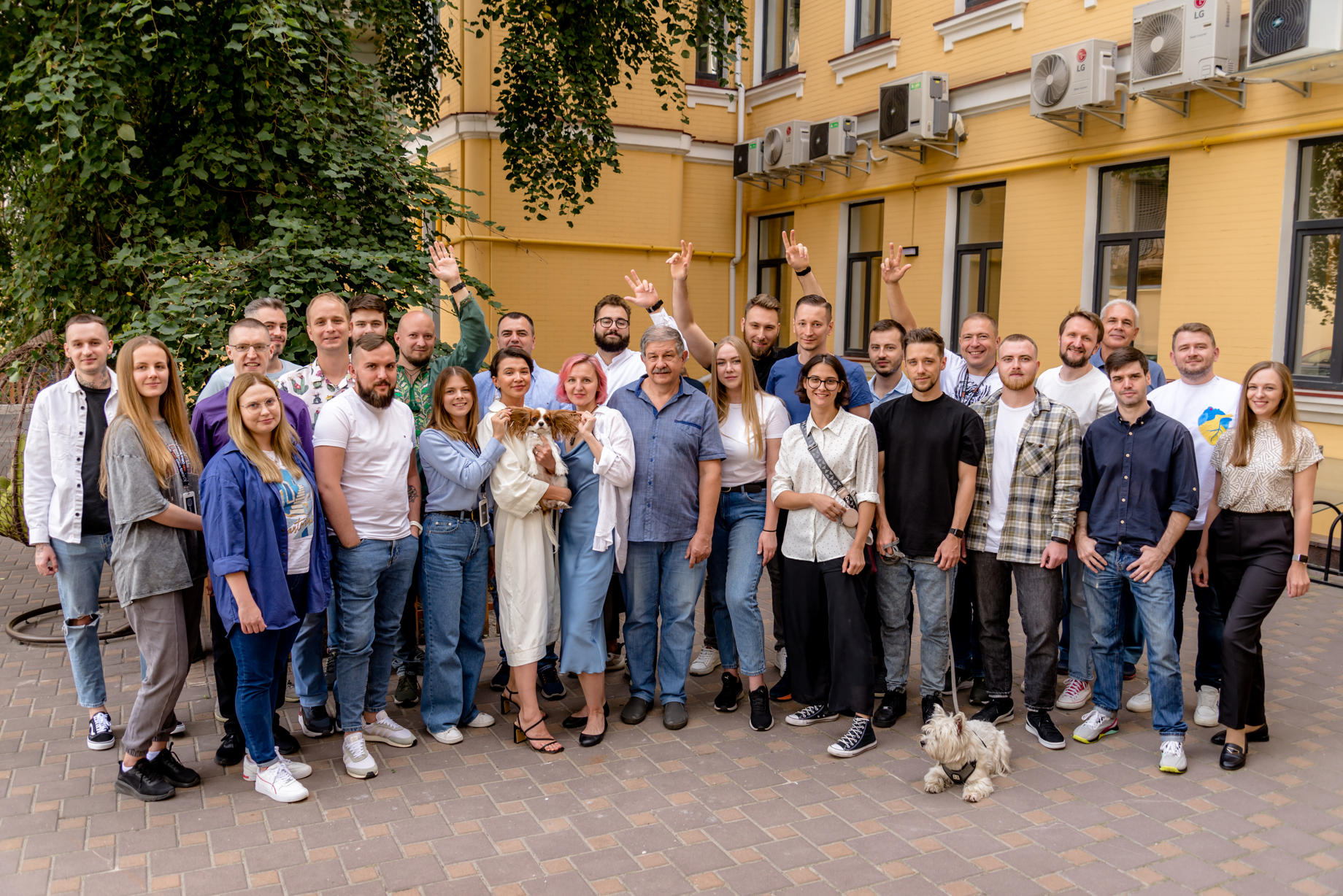The Kitsoft Company, which has been developing and implementing products for vast digitalization over the past 15 years, is one of the main contractors of the Ministry of Digital Transformation of Ukraine. It was the Kitsoft Company which, being commissioned by the said Ministry, developed the IT platform of the Diia state services portal, now known to each and every Ukrainian.
DOU spoke with Kitsoft CEO Oleksandr Iefremov and CTO Volodymyr Sichka, finding out what the project team is like, what government orders they are working on and what impressions they have about interacting with the Ministry of Digital Transformation.
Oleksandr Iefremov, CEO of Kitsoft

Img.: Oleksandr Iefremov, CEO of Kitsoft
About the team, reservation of specialists and gig contracts
Currently, Kitsoft has 83 specialists. Our main product is LIQUIO, a low-code platform for the digitization of government services. Back-end and front-end developers work on it. There is a separate team for creating public portals; they are specialists in PHP and Laravel. There are also business analysts, UX and UI designers, DevOps engineers, project managers, support specialists, content managers who migrate data to new portals, HR managers, communication specialists and administration staff.
The core of Kitsoft is HR director Roma Romanenko, my deputy for operational work Mariia Muzyka, Head of PM Maksym Kurinnyi, CTO Volodya Sichka, CCO Alevtyna Lisniak, and Design Director Mariia Iefremova. I myself have a technological background: I started as a developer and rose to a senior database .NET developer. Then I was a tech leader, CTO, and in 2017 I became the CEO. Since then, the company has changed a lot: we have doubled in size, taken on many new projects, created a low-code platform, structured our work; we have adopted a full-fledged HR and recruiting policy. The projects we are undertaking today are larger. Together with the digitization of the country, Kitsoft is also growing.
Until 2015, we had occasional cooperation with the public sector, mainly automating the insurance market for the Motor (Transport) Insurance Bureau of Ukraine (MTSBU). The creation of the Prozorro electronic public procurement system in 2016 served as a game changer for us. Initially, these processes were hidden and unclear; however, the appearance of Prozorro made them open and gave the opportunity to participate in procurement on clear terms. Since then, we have been participating in state tenders. At first, our main customer was the Kyiv City State Administration, which, by the way, remains our active customer even now. For them, we created a portal, an online service for kindergarten registration, and electronic petitions. Now these services are part of the Kyiv Digital ecosystem.
Currently, 60-70% of our budget consists of contracts with such donor organizations as the United States Agency for International Development (USAID), UK Aid Direct, and the United Nations Development Program. They have their own procurement procedures; while selecting contractors, they are inclined to focus more on the analysis of their potential contractors’ previous experience, as well as evaluating the personnel and financial condition of each company.
Less than a month ago, we went through the reservation procedure (the reservation of conscript workers is a temporary deferment, up to six months, of mobilization (draft), which is granted to key employees of critically important enterprises, companies, institutions or organizations). The process itself is convenient and clear, but it is long — the company spent three to four months on it. We managed to reserve six specialists. This is not enough, since it is about 10% of all men in the team. Yes, some of them have more than children (which serves as a deferment of mobilization/draft), some have other grounds for exemption from the service, but Kitsoft has many more conscripts than those whom we managed to reserve. In addition, they were grated the reservation for only six months, that is, it is time to start the process again in order to have time to extend it for our specialists.
There is another nuance: the nomenclature of military specialties is currently changing. Some of those employees who can hypothetically be reserved need to go to the military commissariat office and update their data themselves. And it is there that this person might be immediately sent to the medical board and be served with a military summons. This has not happened to us yet, but I have heard of such cases. Of course, nobody wants to take risks, and this blocks the possibility of reserving them.
When we joined Diia City, we transferred part of the team to gig contracts. We do not force this; everything happens voluntarily: if you want, you can be on the staff; if you want, you can sign a gig contract or work as a freelancer. At the same time, we see the company's future as having only full-time employees and gig contractors. This is important both for the investment attractiveness of the company and for the future integration with European structures, as well as for the convenience of work organization.

Img.: Kitsoft team
Five most important projects that Kitsoft is working on
- The first is services for the certification of seafarers on the Diia portal. There was a high-profile story when the register of seamen's documents was transferred to private hands, and all processes were corrupt. We took part in the tender and won. We have already launched the first part of the services; we will develop them further. Now seafarers who want to confirm or improve their qualifications do not have to go somewhere in person, submit their documents and run the risk of bribery. Everything can be done remotely and quickly via Diia.
- The second is services for Ukrainian defenders. We co-operate with the Ministry of Veterans Affairs and do a number of projects for them. It is a big challenge for us that all these services should be protected and reliable, without cyber security risks.
- The third is barrier-free services. Rather, it is even a separate direction of the company's work, on which we have been working systematically for a long time. Back in 2019, we created the first design system in Ukraine, in which we collected the principles of accessible sites. Nowadays, accessibility is becoming a trend: texts should be written in an accessible and comprehensible language; interfaces should contain simple large elements without flickering and unnecessary colours; everything should work simply, intuitively, clearly and be convenient for all people. If businesses can afford to ignore some categories of users, then the state has no right to ignore anyone. With the advent of the Ministry of Digital Transformation, the first design system was replaced by Diia; and we, in turn, continue to improve our own standards for inclusiveness — both the convenience of tools for portal administrators and accessibility for users.
- The fourth is the work of services in the construction sector. We have launched 14 services in Diia which enable businesses at various stages of construction to obtain permits from the state and to form declarations. Some of the services are 100% automated – officials are not able to intervene in these processes at all. We are currently working on services that will help to obtain permits for the construction of large residential complexes and industrial facilities. These are complex services that require a large amount of data, as well as the participation of many stakeholders, but they are being gradually digitalized anyway.
- The fifth is the eResident project. We are talking about services for foreign citizens who will be able to obtain tax residency in Ukraine and enjoy the benefits of taxation and banking services, which, in my opinion, are very well developed in our country and are much better than in most countries of the world. This project is fascinating and important, since it can help foreign companies and freelancers to enter the legal field of Ukraine. I cannot talk about deadlines and terms – this is rather the prerogative of the Ministry of Digital Transformation – but we are doing everything within our power to implement the technical part of said project on time.
Volodymyr Sichka, CTO of Kitsoft

Img.: Volodymyr Sichka, CTO of Kitsoft
They usually look for low-code developers and business analysts
I joined Kitsoft in 2015 as a developer, later becoming the Lead and CTO. There is one difference in the structure of our technical team from other IT companies — we have many low-code developers who work on the LIQUIO platform, as well as many business analysts who design and help to digitize data. We are not looking for anyone now, though; the team is complete. Yet, when new projects appear, then we usually need just such specialists.
Two of our colleagues — a QA and a low-code developer — are in the Armed Forces of Ukraine now. For them, their jobs and partially salaries have been saved. We have found a replacement for them, but it is not about temporary work – the new specialists have already been onboarded and will complement the team on a permanent basis.
We have two most important internal projects. The first is improving cyber security: we constantly analyze risks and conduct stress testing. The second is to accelerate the creation of services on our platform and the involvement of artificial intelligence in various processes. Our ultimate goal is that templates of business processes and services are automatically created by artificial intelligence in accordance with the structured TOR, so that low-code developers spend less time on routine actions regarding the services.
I can tell you how our team works, using the example of the service of obtaining grants for veterans and their families. This project united the efforts of the Ministry of Veterans Affairs, the Ministry of Economy and the Ministry of Digital Transformation. Kitsoft had the role of a contractor.
First, high-level working meetings were held to discuss what exactly needs to be created and what the service should look like in general. We have provided recommendations on how it can be done faster, safer and better, taking into account our previous experience.
After the completion of said high-level discussions, the Ministry of Economy made changes to certain regulations, and we, in turn, with the specialists from the Ministry of Digital Transformation, dealt with the technical part. During the whole process, we constantly communicated and created all the necessary integrations. Then, internal testing started — we had to ascertain whether everything was working in accordance with the plan.
After the internal testing, which was carried out by the specialists from Kitsoft and the Ministry of Digital Transformation, the Ministry of Economy organized beta testing and undertook the responsibility for further communication regarding the announcement and presentation of the new service.
Beta testers are ordinary citizens, usually without technical education, who use the online service first and share their impressions. This testing is important to conduct before you go public and present your service officially. Yes, our QAs carry out load testing and check various cases in advance, but beta testers can find new nuances that we did not notice, even though this happens infrequently.
In general, the Ministry of Digital Transformation is driving the digitalization of Ukraine to a large extent. We are pleased to cooperate with them. Finally, there is an institution that oversees the entire process and makes it possible to digitalize what was previously impossible or very difficult. The Ministry consolidated it all. Before its appearance, the digitalization process was also taking place, of course, but much more slowly.
Oleksandr Iefremov, CEO of Kitsoft
Creating an online service for veterans was a technologically complex project.
The project on providing grants for veterans was a real challenge for us. Obviously, it meant serious requirements in terms of cyber security; in this case, under no circumstances could one lose data or make mistakes or backdoors that would lead to cyber attacks.
User access to the submission of said application was developed by our team – we came up with and proposed how to implement it and ensure data security. The process is complicated, since it is necessary to check whether it is a veteran or a member of his family, meaning that the search for family ties also took place in state registers.
We have developed a mechanism that cryptographically guarantees that a person can request data only for himself. For example, a user forms a request using a qualified electronic signature, and the backend automatically checks if this person is requesting data about himself. Our task was to make it impossible for someone to get information about someone else or to find out if a certain person is a veteran.
Previously, we already had the experience of developing services for obtaining grants for opening one's own business, so here we also applied the technology of integration with banks – a screening model similar to the one used by banks when granting loans.
Foreigners speak positively about Diia, but there is still a problem with the registers
I like the Diia application and portal; I use them actively, but I wish there were even more services. A big problem is the poor quality of data in state registers. This does not allow you to quickly start new services or digitize even more documents. The state is working to improve these registries, but there is a long way to go.
Recently, during a conference in London, a member of the British Parliament, Bob Seeley, remarked that they had a lot to learn from Ukrainians and that they would be happy to see Diia developers on their public procurement market. This became a signal for me: if a member of the British Parliament says so, then we should also look in this direction. USAID administrator Samantha Power also positively assessed the work of Diia. She said that for Americans, the possibilities of the application sound like fantasy.
By the way, even during the coronavirus pandemic, at one symposium on digitalization, we saw Americans with paper COVID-19 vaccine certificates. They were also different for different states. In contrast, in Ukraine, such certificates were immediately digitalized, with a QR code that could also be read abroad. Foreigners were surprised when they saw an unfamiliar application, but they scanned the QR code and it worked for them. Such things were already noticed even then. Currently, many people were forced to leave Ukraine, but they continue to be users and carriers of such a miraculous cutting-edge application as Diia, so they contribute to the promotion of our digitalization abroad.
About entering the markets of Eastern Europe and the Middle East
We have plans to enter international markets. Our LIQUIO platform can become the basis for creating municipal applications and portals in different cities and countries. We have already signed the first contracts; we are starting to develop this business in Eastern Europe and we recently presented our project in Liverpool. The Middle East and South Korea are also among the priorities.
In Europe, the market of public services functions similarly to the Ukrainian market: first of all, there must appear demand, so that the authorities understand that such services exist at all. For example, a certain application for citizens first needs to be presented to state authorities in order to convince them that it would be cool to do something similar for Lodz or Wroclaw, thereby encouraging internal discussion. If they show interest, they announce a tender, and then we can offer our system. This is generally a long way; it can last for six months or a year. But in the Middle East, everything is organized differently. There, the management system is more authoritarian, and the city management independently decides how to procure services.
About digitization and its impact on corruption
I would like to point out another project that we developed for the National Agency on Corruption Prevention (NACP) — the Unified Whistleblower Reporting Portal. In brief, it enables citizens to report corruption suspicions or certain questionable actions of officials. You may have heard of the whistleblower policy in the US, which encourages citizens to report wrongdoing. In Ukraine, it was also possible to complain about corruption before. But what was done with that information? There was no legislation and no real instrument by which the corruption report would be accurately considered. Now, a responsible person will be appointed for each report, and they will accurately analyze, answer or refute the received data, and the entire process will be monitored by the NACP.
In general, in Ukraine, corruption has long served as a tool for speeding up processes that were moving slowly due to bureaucracy. In principle, you could get the service without a bribe, but you had to wait for ages, coming to different offices many times, and then some "important people" appeared that promised to solve the problem promptly. In fact, the imperfection of the paper process created favourable conditions for corruption.
Now in Ukraine we already have cameras that record speed on the roads. Not everyone likes them, though, especially when they get automatic fines for speeding. Still, one must agree that it is much better than when you are stopped by some incomprehensible "traffic officers" who may suggest you should "tip them" for letting you go or might even directly compel you to bribe them. The state should both control and help. When interaction with the state happens transparently and via digital tools, it saves money and time, eliminates corruption, increases the level of satisfaction of citizens, and improves the perception of the state itself — from a stable minus to a cautious plus.
To reiterate, by digitalizing the interaction between people and the state, we are destroying corruption. I am not ready to say exactly how much money our services have helped the state to save, but I think it is about billions of hryvnias.